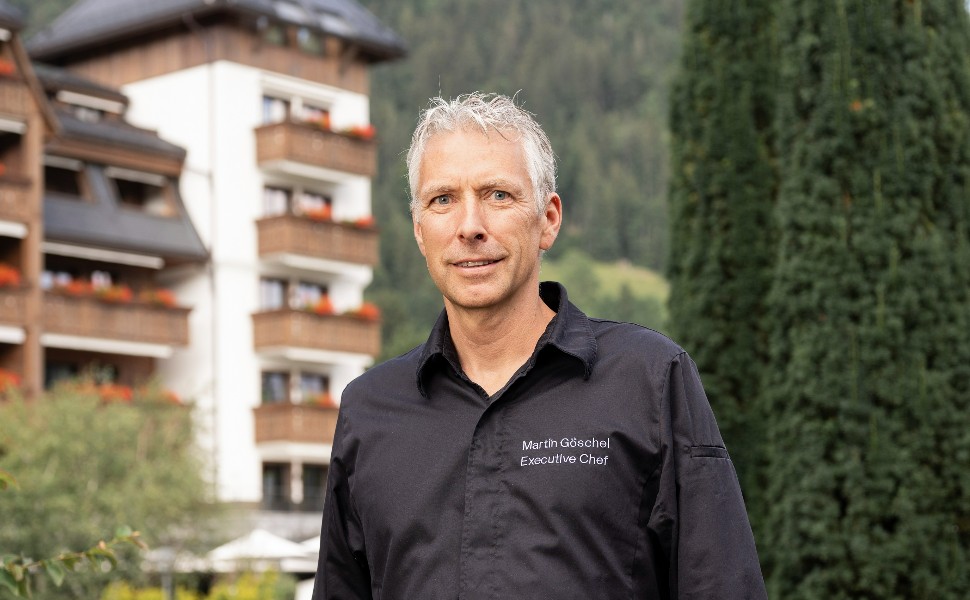
Executive Chef Martin Göschel shares his passion for local ingredients, low-waste practices, and shaping the future of fine dining at The Alpina Gstaad.
My journey to becoming a chef was quite simple. I spent a lot of time in the kitchen with my mother and grandmother, but I didn’t decide at a young age that I wanted to be a chef. It wasn’t until later, when I worked in various restaurants to earn some money, that I realised how much I enjoyed it. I worked in kitchens, as a steward, and as a waiter. That’s when I started to take the idea of becoming a chef seriously. When I began my apprenticeship, I made it clear that I wanted to train in a top restaurant. I moved 200 kilometres from my hometown to work in a two-star MICHELIN restaurant.
The Alpina Gstaad allows me a lot of creative freedom. I can bring my ideas to life on the plate and think about the entire dining experience — whether we use cutlery or eat with our hands. While MICHELIN stars and points matter, I believe the overall restaurant experience is what counts most. I focus on everything, from gourmet dishes to comfort food, room service, and events. The goal is to ensure that everything runs smoothly, and the key is balance, making sure all the restaurants contribute to the bigger picture. Filling a gourmet restaurant every night is challenging, but it plays an essential role in what we offer at The Alpina Gstaad.
Are you asking about my style in the gourmet restaurant or when I cook for my kids? (laughs) I love working with Swiss products, particularly local meats and special ingredients we have here, like quail and fish from the lakes and rivers. Being far from the ocean, I miss having easy access to seafood, but I can incorporate it into the restaurants where needed. For our gourmet dishes, I focus heavily on local ingredients. I get a lot of inspiration from nature. When I go hiking in the mountains, I often find herbs or other elements that inspire me to integrate them into my dishes.
Sometimes I find herbs specific to this region. For example, you can make a dessert using meadowsweet, which grows here in the mountains. It pairs beautifully with apricots from Valais. This combination really represents Switzerland, blending the herbs from the mountains with fruits from other regions. It’s a way to bring together different regional flavours in one dish.
Since we’re a seasonal hotel, we only operate in two main seasons — summer and winter. Summer is easy because everything is available at the market. Winter is more difficult, with local produce mainly limited to meats, cheese, and some vegetables from greenhouses. We often preserve summer produce, like herbs and vegetables, through freezing or fermentation so we can use them during the winter. This allows us to continue working with regional ingredients, even out of season.
We work with many local producers. For example, we work with Daniel von Siebenthal, a vegetable supplier with a small farm and greenhouse near Gstaad. We also work with Buure Metzg, a local butcher. While we’re not always in season for wild game like deer, I love cooking with it, especially for family meals. We also source cheeses from local factories in Gstaad and Rougemont. For breakfast, we serve five or six different kinds from various mountain regions, each with its own unique taste. We also source quail from a small farm located in Gstaad, and though we’re taking it off the menu this winter, we plan to bring it back next summer.
We aim to reduce waste as much as possible, although it can be challenging in a five-star hotel. A few years ago, we discovered bread waste was a big issue, as we often had leftover bread. Rather than using it for crumbles or dumplings, we created a pasta made from the leftover bread, which became very popular. Now, a social enterprise, Töpferhaus Aargau, helps produce it, and we sell it in Coop, a well-known Swiss supermarket. We’ve also developed our own in-house bakery. Now, 70-80% of our baked goods are homemade, from breakfast pastries to burger buns, all in line with our commitment to reducing waste while maintaining quality. The only exception is our special gluten-free breads, which are sourced externally. What’s wonderful is that our teams in the kitchens are part of a new generation that already embraces this low-waste philosophy. They bring me ideas on how we can improve and reduce waste. I do organise and implement those ideas, but the actual drive and creativity come from them.
The goal is to earn a second MICHELIN star and 19 points, of course! Overall, our goal is to continue providing an exceptional experience, ensuring that our guests are satisfied and our restaurants are fully booked each night. Right now, we’re planning to offer two seating times per evening, but I hope to add a third seating in the future to accommodate even more guests. Our dining experience is about evolving while staying true to our values and quality.